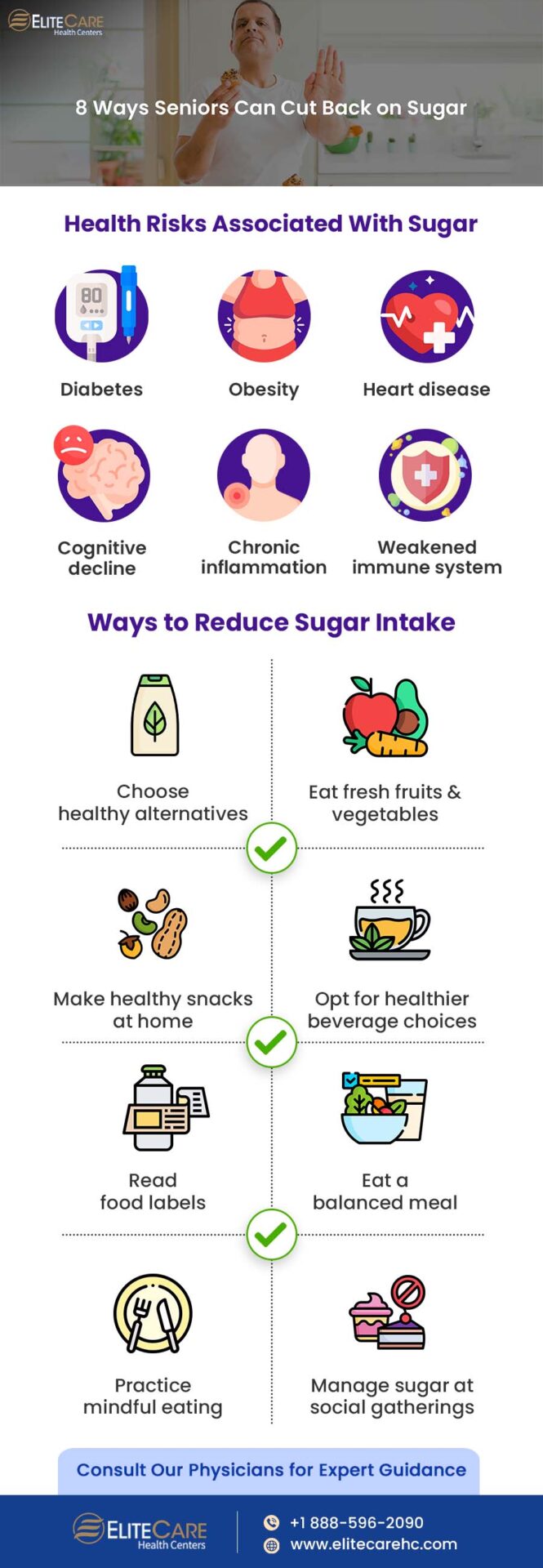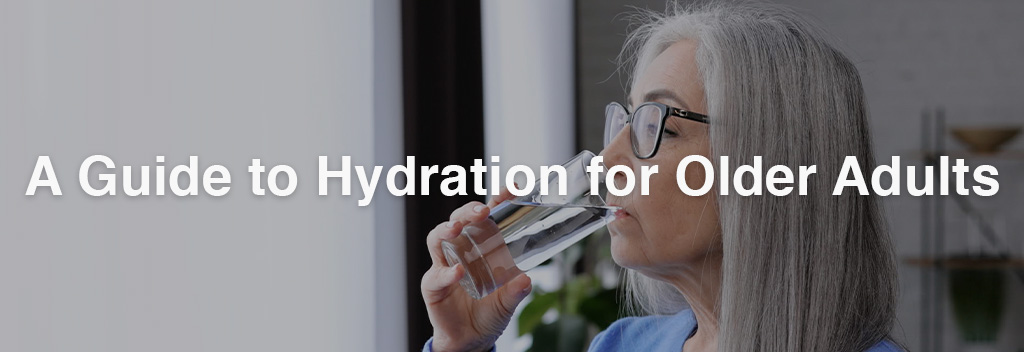
Sugar maybe fine for one’s health if consumed in small amounts, but excessive intake can lead to many chronic health issues. Increased consumption of sugar has become prevalent among seniors fueled by change in taste, dietary habits, and reduced physical activity.
Why Sugar Is Bad for Seniors’ Health
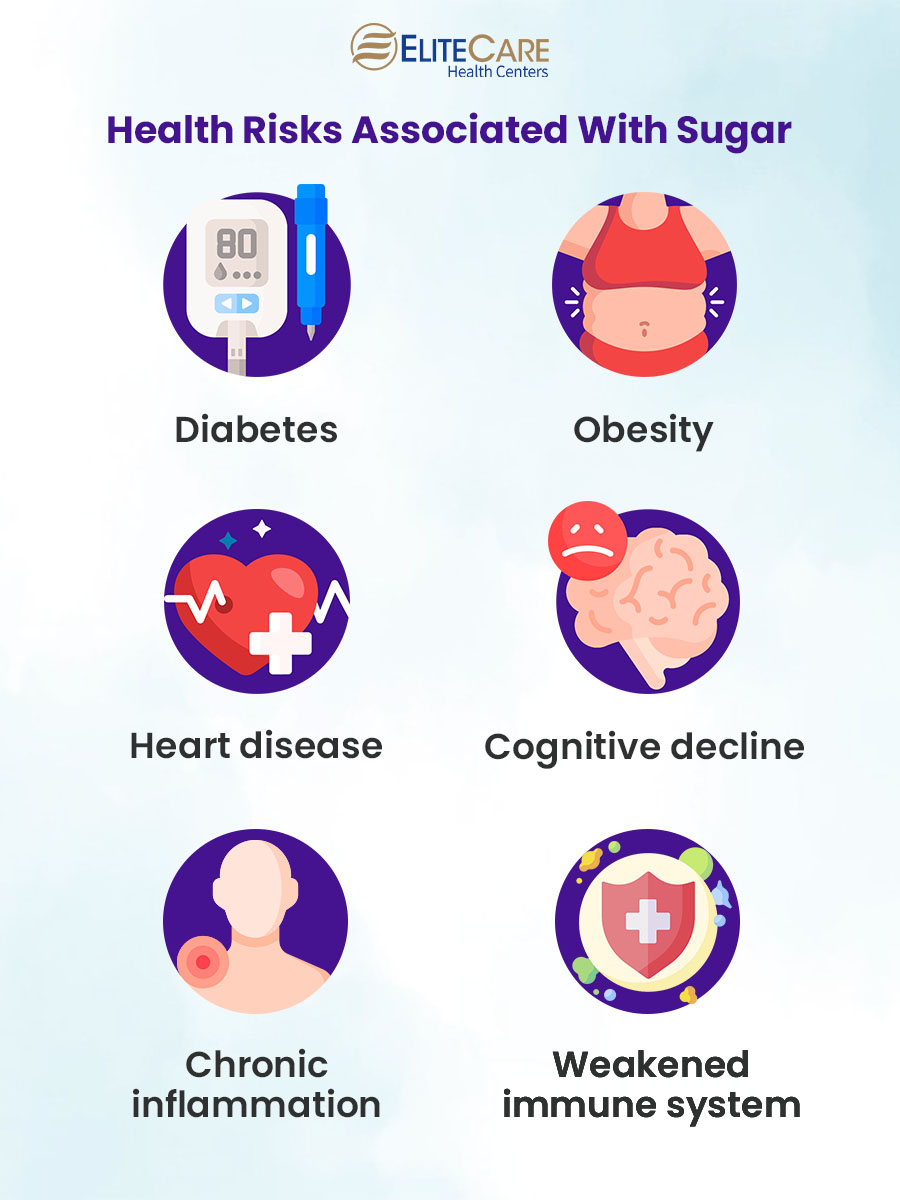
Sugar is detrimental to seniors’ health for several reasons. Some potential health risks associated with high sugar daily intake in older adults are as follows:
1. Diabetes
The average adult consumes 17 teaspoons of added sugar in the United States daily. That accounts for 14% of total calorie intake, in case one is following a 2,000-calorie diet. Experts believe that sugar consumption is a major cause of type 2 diabetes. With age, the body becomes less efficient at regulating blood sugar levels, making seniors more susceptible to this condition. Diabetes can lead to complications such as cardiovascular disease, nerve damage, and impaired wound healing.
2. Heart Disease
Seniors who consume a diet high in sugar are more likely to develop conditions like high blood pressure, elevated cholesterol levels, and obesity, all contributing to heart disease.
3. Cognitive Decline
4. Inflammation and Immune System Suppression
Sugar consumption can contribute to chronic inflammation in the body, leading to a weakened immune system. For seniors, a compromised immune system can increase susceptibility to infections and delay the healing process.
5. Obesity
Seniors who consume sugary foods and beverages regularly are more likely to have excess body weight, leading to joint issues, decreased mobility, and increased risk of chronic diseases.
To mitigate these risks, senior care services can empower seniors to make informed choices and prioritize their health by providing support and guidance.
How Can Senior’s Keep Track on Their Sugar Intake
Some guidelines to help seniors determine their daily recommended sugar intake and track their consumption effectively are as follows
1. Daily Recommended Sugar Intake
2. Tracking Sugar Consumption
Seniors can track their sugar intake by monitoring food labels, using mobile apps, or keeping a written record. Tracking sugar consumption also enables seniors to set goals and measure progress toward reducing their intake over time.
8 Ways to Reduce Sugar Intake in Senior’s Diet
To help seniors make healthier choices and reduce their sugar intake, we will explore eight simple ways to easily incorporate them into their daily lives. By implementing these strategies, seniors can protect their health and enhance their well-being.
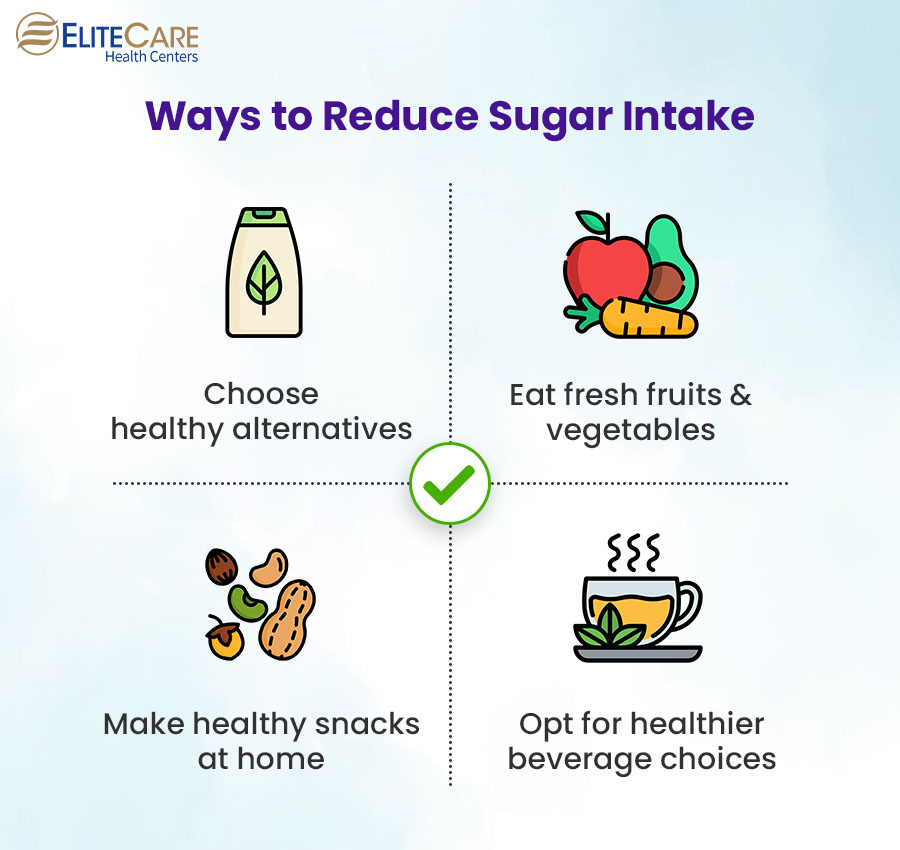
1. Choose Healthy Alternatives
Seniors can opt for healthier alternatives to refined sugar. Stevia and monk fruit are excellent alternatives and have a minimal impact on blood sugar levels and provide sweetness without extra calories. They can be used in beverages, baked goods, and other recipes to help reduce overall sugar intake.
2. Sugar Craving? Eat Fresh Fruits and Vegetables
Fruits, like berries, apples, and oranges, can be enjoyed as snacks, added to salads, or used as natural sweeteners in recipes. Vegetables like sweet potatoes and carrots can also add natural sweetness to meals. These food items are packed with natural sugars, fibers, and essential nutrients. These are sweet and nourishing alternatives.
3. Make Healthy Snack and Dessert Recipes at Home
Explore options like fruit salads, yogurt parfaits with fresh berries, chia seed pudding, homemade granola bars, or baked goods made with whole grain flour and reduced sugar content. These recipes can be delicious alternatives to traditional high-sugar snacks and desserts.
Seniors can also try the following low-sugar snack options:
a. Greek yogurt with fresh berries, a drizzle of honey, or a sprinkle of cinnamon
b. Raw vegetables with hummus or homemade salsa
c. Nuts and seeds (e.g., almonds, walnuts, chia seeds) for a satisfying and nutrient-dense snack
d. Apple slices with a small serving of nut butter
While these options provide better nutritional profiles, enjoying them in moderation is still important as part of a balanced diet. Online doctor consultations can also provide convenient access to healthcare experts, enabling seniors to make informed decisions about their dietary habits.
4. Regulate Sugary Beverage Choices
When managing sugar intake, one area to pay close attention to is beverage choices. Soda, fruit juices, and sweetened coffee or tea contain substantial added sugars, leading to increased calorie intake and potential health complications.
Instead, opt for healthier alternatives such as:
a. Infused Water– Staying hydrated with plain water is essential for overall health and helps avoid unnecessary sugar intake.
b. Herbal Tea– Unsweetened herbal teas offer a variety of flavors without adding sugar. They can be enjoyed hot or iced, providing hydration and potential health benefits.
c. Unsweetened Alternatives– Seniors can choose unsweetened coffee or tea and gradually adjust their taste preferences by reducing sugar or sweetener added over time.
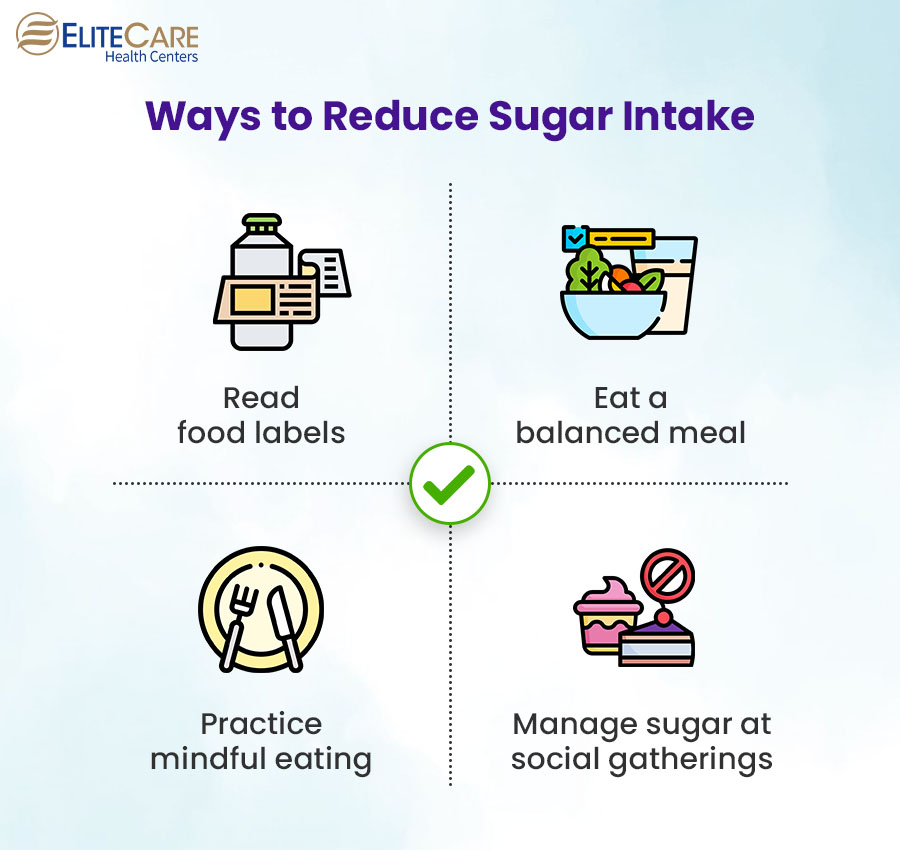
5. Read Food Labels
Caregivers or senior care service providers can educate seniors on the importance of checking “Total Sugars” section on food labels. To identify added sugars, look for terms such as “sucrose,” “high-fructose corn syrup,” “dextrose,” or “molasses” in the ingredient list. Be aware that sugar can hide under various names, so it’s essential to familiarize yourself with these alternate names. Additionally, check the total grams of sugar per serving and compare it to the recommended daily sugar intake. Comparing the sugar content among different brands can also be a great way to lower the sugar content when selecting similar products.
6. Planning Healthy Meals
To create healthy and balanced meals, it’s important for seniors to base their meals around whole, unprocessed foods. This includes incorporating lean proteins such as poultry, fish, and legumes, along with whole grains like quinoa, brown rice, and whole wheat bread. Fiber-rich vegetables should also be included to provide essential nutrients while naturally containing lower amounts of added sugars.
Caregivers or senior care service providers can assist in offering sample meal ideas that encompass these food groups. For example, a balanced dinner could consist of grilled chicken breast, quinoa pilaf, and steamed broccoli, while snacks may include fresh fruit with a handful of nuts or yogurt topped with berries and a sprinkle of granola. These ideas help seniors visualize well-rounded meals that are not only nutritious but also delicious.
7. Practice Mindful Eating
Seniors should eat slowly, savor their meals, and recognize their hunger and fullness cues. By practicing portion control, seniors can enjoy their favorite foods in moderation. By being present and attentive during meals and snacks, seniors can make intentional choices, listen to their body’s needs, and cultivate a healthier relationship with food.
8. Managing Sugar in Social Situations
Social gatherings and dining out can present challenges when managing sugar intake, as sugary foods are often prevalent. However, there are strategies seniors can employ to navigate these situations while still maintaining their sugar intake goals. One approach is to choose healthier options when available, such as opting for fresh fruit or a small serving of a low-sugar dessert. Another option is to bring a healthy dish to share, ensuring there’s a nutritious option available.
Additionally, open communication with friends, family, and restaurant staff about dietary preferences and needs can help create a supportive and understanding environment. By making mindful choices and planning, seniors can enjoy social gatherings while managing their sugar intake effectively
Seeking Professional Guidance
Consulting healthcare professionals, such as dietitians or nutritionists, who can provide personalized advice and support can be helpful. Here are some key points to emphasize:
1. Personalized Guidance
Seniors can highlight their dietary needs during routine or annual physical exams with the primary care physician. Accordingly, a primary care physician can connect seniors with a dietician or nutritionist or, through their senior care services, can assess seniors’ specific dietary needs, medical conditions, and goals to create tailored plans for reducing sugar intake. They can offer valuable insights, meal planning strategies, and practical tips to make healthier choices.
2. Support Groups and Community Programs
Joining support groups or community programs focused on healthy eating habits can help seniors share their experiences, exchange ideas, and learn from one another. Being part of such programs can help you stay motivated, gain knowledge, and build a sense of community.
3. Making Gradual Changes and Seeking Support
Reducing sugar intake is a process that takes time and patience. Make gradual changes instead of attempting drastic alterations all at once.
Seniors can seek support from loved ones, friends, or support groups during the journey. A support system can provide encouragement, guidance, and accountability, making it easier to sustain healthier habits.
The Bottom Line
Try taking proactive steps to healthier habits. Celebrate small victories along the way. Progress is not always linear, and setbacks may occur. Stay committed, seek support when needed, and focus on the long-term benefits of reducing sugar intake for overall health and well-being.
On the journey to live a better and healthy life, the best medical clinic Elite Care Health Center can provide valuable resources and services to help seniors navigate the challenges and make healthier choices in their daily lives.
